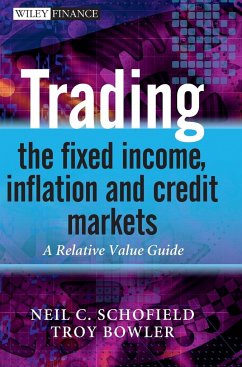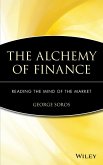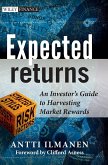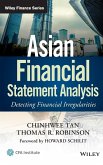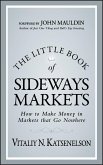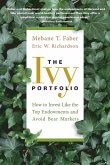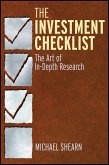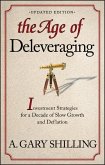- Gebundenes Buch
- Merkliste
- Auf die Merkliste
- Bewerten Bewerten
- Teilen
- Produkt teilen
- Produkterinnerung
- Produkterinnerung
In this book, the authors give an applied approach to relative value techniques, showing readers how to decide on the best place to put their money in order to get the best return. They cover multiple asset classes - fixed income, commodities and equities although the main focus is fixed income. They cover products that are rarely documented such as CMS floaters and structured interest and credit products.
The initial part of the book will consider the main derivative products and their pricing interrelationships. It argues that within any asset class there are mathematical relationships…mehr
Andere Kunden interessierten sich auch für
![The Alchemy of Finance The Alchemy of Finance]() George SorosThe Alchemy of Finance159,99 €
George SorosThe Alchemy of Finance159,99 €![Expected Returns Expected Returns]() Antti IlmanenExpected Returns68,99 €
Antti IlmanenExpected Returns68,99 €![Asian Financial Statement Analysis Asian Financial Statement Analysis]() ChinHwee TanAsian Financial Statement Analysis88,99 €
ChinHwee TanAsian Financial Statement Analysis88,99 €![The Little Book of Sideways Markets The Little Book of Sideways Markets]() Vitaliy N. KatsenelsonThe Little Book of Sideways Markets22,99 €
Vitaliy N. KatsenelsonThe Little Book of Sideways Markets22,99 €![The Ivy Portfolio The Ivy Portfolio]() Mebane T. FaberThe Ivy Portfolio20,99 €
Mebane T. FaberThe Ivy Portfolio20,99 €![The Investment Checklist The Investment Checklist]() Michael ShearnThe Investment Checklist42,99 €
Michael ShearnThe Investment Checklist42,99 €![The Age of Deleveraging, Updated Edition The Age of Deleveraging, Updated Edition]() A. Gary ShillingThe Age of Deleveraging, Updated Edition20,99 €
A. Gary ShillingThe Age of Deleveraging, Updated Edition20,99 €-
-
-
In this book, the authors give an applied approach to relative value techniques, showing readers how to decide on the best place to put their money in order to get the best return. They cover multiple asset classes - fixed income, commodities and equities although the main focus is fixed income. They cover products that are rarely documented such as CMS floaters and structured interest and credit products.
The initial part of the book will consider the main derivative products and their pricing interrelationships. It argues that within any asset class there are mathematical relationships that tie together four key building blocks: cash products, forwards / futures, swaps and options. The nature of these interrelationships means that there may be a variety of different ways in which a particular strategy can be expressed.
The second part of the book will be focused primarily on relative value within a fixed income context and will look at strategies that build on the pricing relationships between products as well as those that focus on how to identify the optimal way to express a view on the movement of the yield curve.
The third part of the book will take the main themes of relative value and show how they could be applied within other asset classes.
Hinweis: Dieser Artikel kann nur an eine deutsche Lieferadresse ausgeliefert werden.
The initial part of the book will consider the main derivative products and their pricing interrelationships. It argues that within any asset class there are mathematical relationships that tie together four key building blocks: cash products, forwards / futures, swaps and options. The nature of these interrelationships means that there may be a variety of different ways in which a particular strategy can be expressed.
The second part of the book will be focused primarily on relative value within a fixed income context and will look at strategies that build on the pricing relationships between products as well as those that focus on how to identify the optimal way to express a view on the movement of the yield curve.
The third part of the book will take the main themes of relative value and show how they could be applied within other asset classes.
Hinweis: Dieser Artikel kann nur an eine deutsche Lieferadresse ausgeliefert werden.
Produktdetails
- Produktdetails
- Wiley Finance Series
- Verlag: Wiley & Sons
- 1. Auflage
- Seitenzahl: 320
- Erscheinungstermin: 30. September 2011
- Englisch
- Abmessung: 250mm x 175mm x 21mm
- Gewicht: 719g
- ISBN-13: 9780470742297
- ISBN-10: 0470742291
- Artikelnr.: 33239148
- Herstellerkennzeichnung
- Libri GmbH
- Europaallee 1
- 36244 Bad Hersfeld
- 06621 890
- Wiley Finance Series
- Verlag: Wiley & Sons
- 1. Auflage
- Seitenzahl: 320
- Erscheinungstermin: 30. September 2011
- Englisch
- Abmessung: 250mm x 175mm x 21mm
- Gewicht: 719g
- ISBN-13: 9780470742297
- ISBN-10: 0470742291
- Artikelnr.: 33239148
- Herstellerkennzeichnung
- Libri GmbH
- Europaallee 1
- 36244 Bad Hersfeld
- 06621 890
NEIL C. SCHOFIELD is the principal of FMT Ltd, a UK-based company offering training services in the areas of treasury, derivatives, capital markets and risk management to financial institutions, central banks and corporations worldwide. Neil was Global Head of Financial Markets Training at Barclays Capital from 2001 to 2008. He teaches primarily on the rates business, covering all of the major asset classes and their respective derivative products from foreign exchange through to commodities. Before joining Barclays Capital, he was a director at Chisholm-Roth Training for 4 years, where he was responsible for provision of training services for a number of blue chip global investment banks. Clients included Citigroup, Deutsche Bank, Goldman Sachs and JP Morgan Chase. He started his training career at Chase Manhattan Bank, where he was originally employed as an internal auditor. Over a period of nine years, he conducted numerous internal and external training seminars including the Bank of England and the Federal Reserve System in the USA. He has also held positions with Security Pacific Hoare Govett (now trading as Bank of America) and Lloyds TSB. Neil holds a B.Sc. in Economics from Loughborough University and an MBA from Manchester Business School. He was elected as a Fellow of the IFS School of Finance (formerly the Chartered Institute of Bankers) in 1999. Neil was appointed as a Visiting Fellow at the University of Reading ICMA centre in April, 2007. He is author of the book Commodity Derivatives: Markets and Applications published by John Wiley & Sons, Ltd in October 2007. TROY BOWLER joined Barclays Capital in London in 2002 and is currently a Managing Director within Distribution, based in Singapore. Before joining Barclays Capital, he held positions at Deutsche Bank in London, where he was part of their highly-regarded global fixed income and relative value research team; PaineWebber; and Bank of Tokyo Capital Markets (UK), where he was Chief Economist; and Charterhouse Investment Management Limited, where he managed money-market funds, including the #1 ranked GBP unit trust according to Micropal (acquired by The McGraw-Hill Companies in 1997). He is a former member of the Institute of Investment Management and Research (IIMR), now known as CFA UK, Examination Committee where he helped revamp the IIMR's examinations - widening the remit to encompass fixed income professionals as opposed to focussing almost exclusively on equity markets. Troy holds a B.Sc. in Economics from Loughborough University and an M.Sc. in Economics from London University.
Preface xiii
Acknowledgements xv
About the Authors xvii
1 Product Fundamentals 1
1.1 Chapter Overview 1
1.2 Bond Fundamentals 1
1.2.1 Fixed income structures 1
1.2.2 Floating-rate notes 2
1.2.3 Inflation 2
1.3 Repurchase Agreements 5
1.4 Credit Fundamentals 7
1.5 Derivative Fundamentals 8
1.5.1 Futures 8
1.5.2 Forwards 9
1.5.3 Swaps 11
1.5.4 Vanilla options 18
1.5.5 Exotic options 21
2 Pricing Relationships 23
2.1 Relative Value 23
2.2 The Relative Value Triangle 23
2.3 Spot Pricing 24
2.3.1 Pricing fixed income securities 24
2.3.2 Par yield curves 27
2.3.3 Zero-coupon yield curves 27
2.3.4 Forward yield curves 30
2.3.5 Pricing floating-rate notes 36
2.3.6 Inflation pricing 37
2.3.7 Credit pricing 39
2.4 The Spot-Forward Relationship 40
2.4.1 Fixed income 40
2.4.2 Credit markets 42
2.5 The Spot-Swap Relationship 43
2.5.1 Pricing swaps - counterparty credit risk 46
2.6 The Forward-Swap Relationship 49
2.7 Pricing Options-Relationship With The Underlying Market 49
2.7.1 Black-Scholes-Merton: an intuitive approach 50
2.7.2 From closed-form to binomial pricing techniques 52
2.7.3 Monte Carlo simulation 55
2.7.4 Put-call parity 56
Appendix 2.1 Monetary Policy and Overnight Interest Rates 57
Appendix 2.2 OIS Discounting 59
3 Market Risk Management 63
3.1 What Do We Mean By Risk? 63
3.2 Defining Market Risk 63
3.3 Spot Market Risk 64
3.3.1 Macaulay duration 64
3.3.2 Modified duration 65
3.3.3 Convexity 66
3.3.4 Dollar value of an 01 68
3.3.5 Market risk of a floating-rate note 69
3.3.6 Market risk of credit instruments 70
3.4 Forward Risk 72
3.4.1 Fixed income 73
3.4.2 Credit 73
3.5 Swap Market Risk 73
3.5.1 Spot swap risk 73
3.5.2 Carry and roll down 75
3.5.3 Application of DV 01 75
3.5.4 Forward-starting swap risk 76
3.6 Option Risk Management 79
3.6.1 Delta 80
3.6.2 Gamma 82
3.6.3 Theta 87
3.6.4 Vega 88
3.6.5 Smiles, skews and surfaces 92
3.7 Value at Risk 93
4 Expressing Views on the Interrelationships between Products 97
4.1 The Spot-Forward Relationship 98
4.1.1 Bond futures 98
4.1.2 The cheapest to deliver 100
4.1.3 Changes in the cheapest to deliver 105
4.1.4 The yield beta 108
4.1.5 Trading the basis 108
4.1.6 Implementing a basis trade 113
4.2 The Spot-Swap Relationship 117
4.2.1 Understanding swap spreads 117
4.2.2 Negative swap spreads 121
4.3 The Forward-Swap Relationship 122
4.4 Options and Trading Volatility 123
4.4.1 Expressing views on market direction and volatility 123
4.4.2 Assessing volatility: cheap or rich? 138
4.4.3 Expressing views on volatility of volatility 139
4.4.4 The relationship between volatility and the underlying asset 140
5 Identifying Value in Sovereign Bonds 149
5.1 What Is Relative Value? 149
5.2 Understanding the Yield Curve 150
5.2.1 Yield curve formation 150
5.2.2 How does the yield curve move? 153
5.2.3 Yield curve movements 154
5.2.4 How do yield curves actually move? 154
5.2.5 Yield curve modelling 160
5.3 Measures of Spread 162
5.3.1 Decomposing bond yields 162
5.3.2 Swap spreads 164
5.3.3 CDS spreads 164
5.3.4 I-spread 165
5.3.5 TED spread 165
5.3.6 Z-spread 165
5.3.7 Option-adjusted spread 166
5.3.8 Asset swap spread 167
5.4 Identifying Value in Sovereign Bonds Using Asset Swaps 170
5.4.1 Determining the appropriate benchmark 170
5.4.2 Term structure of asset swap spreads 171
5.4.3 Assessing value in sovereign bonds 172
5.4.4 Forward asset swap spreads 176
5.4.5 Inflation-linked asset swaps 178
5.5 Summary of Yield Measures 179
Appendix 5.1 Curve flattening trade 180
6 Trading the Yield Curve 183
6.1 Trading Terminology 183
6.1.1 Long or short? 183
6.1.2 Roll down and carry revisited 183
6.2 Trading the Short End of the Yield Curve 186
6.2.1 Money-market loans and deposits 186
6.2.2 Interest rate futures 186
6.2.3 Interest rate swaps 190
6.2.4 Options on single-period short-term interest rates 192
6.3 Trading the Slope of the Yield Curve 192
6.3.1 Short-term interest rate futures vs. bond futures 192
6.3.2 Fed Funds futures vs. interest rate swaps 193
6.3.3 Bonds and swaps 193
6.3.4 Conditional curve trades 197
6.3.5 Identifying slope trades using swaptions 199
6.3.6 Volatility and the level of interest rates 200
6.4 Trading the Curvature of the Yield Curve 202
6.4.1 An overview of butterfly spreads 202
6.4.2 2s5s10s Butterfly trade using bonds 203
6.4.3 2s5s10s Butterfly trade using swaps 206
6.4.4 Forward and spot spreads and carry 213
6.4.5 Volatility and yield curve slope and curvature 213
6.5 Volatility, Curvature and Skew 214
6.6 Constant-Maturity Products 217
6.6.1 Product definitions 217
6.6.2 CMS product pricing 218
6.6.3 CMS sensitivities and impact on market 219
6.6.4 Applications of CMS products 219
6.7 Structured Products - Range Accruals 220
7 Relative Value in Credit 223
7.1 Applying the Relative Value Triangle to Credit 223
7.1.1 The bond-credit default swap relationship 223
7.1.2 The forward-swap relationship 228
7.1.3 Volatility 230
7.2 Expressing Views on the Credit Term Structure 235
7.2.1 Steepening/flattening trades 235
7.2.2 Butterfly trades 237
7.2.3 Convexity 238
7.3 Expressing a View on a Single Reference Entity 239
7.3.1 Credit-linked notes 239
7.3.2 Expressing a view on a single reference entity - an example 242
7.4 Expressing a View on a Basket of Reference Entities 243
7.4.1 Total return swaps 243
7.4.2 Basket default swaps 244
7.4.3 Index tranche investing 246
8 Relative Value in Inflation 251
8.1 Payers and Receivers of Inflation 252
8.2 Term Structure of Breakeven Inflation and Real Yields 252
8.2.1 Trading the slope of inflation curves 252
8.2.2 The importance of liquidity 253
8.3 Seasonality 254
8.4 Identifying Value in Inflation-Linked Bonds 255
8.4.1 Fitted curves - cheap/rich analysis 255
8.4.2 Forward rate analysis 257
8.4.3 Butterfly trades 258
8.5 An Overview of Inflation-Linked Trading Strategies 258
8.5.1 Inflation market risk 258
8.5.2 Forward prices and carry 259
8.5.3 Summary of popular inflation trades 260
8.6 Expressing Views on Breakeven Inflation 260
8.6.1 Cash strategies 260
8.6.2 Derivative strategies 263
8.6.3 Expressing views on swap breakevens 265
8.7 Expressing Views on Real Yields 266
8.7.1 Total return inflation swaps 267
8.7.2 Real rate swap 267
8.8 Forward Breakevens 268
8.8.1 Background 268
8.8.2 Assessing the risk premium 269
8.8.3 Trading forward breakevens using bonds 269
8.8.4 Trading forward breakevens using swaps 272
8.8.5 Calculating forward swap rates 273
8.8.6 Forward real-yield trades 274
8.9 Using Options to Express Views on Breakeven and Real Yields 274
9 Trading Axioms: An A to Z 277
Notes 281
Bibliography 283
Index 285
Acknowledgements xv
About the Authors xvii
1 Product Fundamentals 1
1.1 Chapter Overview 1
1.2 Bond Fundamentals 1
1.2.1 Fixed income structures 1
1.2.2 Floating-rate notes 2
1.2.3 Inflation 2
1.3 Repurchase Agreements 5
1.4 Credit Fundamentals 7
1.5 Derivative Fundamentals 8
1.5.1 Futures 8
1.5.2 Forwards 9
1.5.3 Swaps 11
1.5.4 Vanilla options 18
1.5.5 Exotic options 21
2 Pricing Relationships 23
2.1 Relative Value 23
2.2 The Relative Value Triangle 23
2.3 Spot Pricing 24
2.3.1 Pricing fixed income securities 24
2.3.2 Par yield curves 27
2.3.3 Zero-coupon yield curves 27
2.3.4 Forward yield curves 30
2.3.5 Pricing floating-rate notes 36
2.3.6 Inflation pricing 37
2.3.7 Credit pricing 39
2.4 The Spot-Forward Relationship 40
2.4.1 Fixed income 40
2.4.2 Credit markets 42
2.5 The Spot-Swap Relationship 43
2.5.1 Pricing swaps - counterparty credit risk 46
2.6 The Forward-Swap Relationship 49
2.7 Pricing Options-Relationship With The Underlying Market 49
2.7.1 Black-Scholes-Merton: an intuitive approach 50
2.7.2 From closed-form to binomial pricing techniques 52
2.7.3 Monte Carlo simulation 55
2.7.4 Put-call parity 56
Appendix 2.1 Monetary Policy and Overnight Interest Rates 57
Appendix 2.2 OIS Discounting 59
3 Market Risk Management 63
3.1 What Do We Mean By Risk? 63
3.2 Defining Market Risk 63
3.3 Spot Market Risk 64
3.3.1 Macaulay duration 64
3.3.2 Modified duration 65
3.3.3 Convexity 66
3.3.4 Dollar value of an 01 68
3.3.5 Market risk of a floating-rate note 69
3.3.6 Market risk of credit instruments 70
3.4 Forward Risk 72
3.4.1 Fixed income 73
3.4.2 Credit 73
3.5 Swap Market Risk 73
3.5.1 Spot swap risk 73
3.5.2 Carry and roll down 75
3.5.3 Application of DV 01 75
3.5.4 Forward-starting swap risk 76
3.6 Option Risk Management 79
3.6.1 Delta 80
3.6.2 Gamma 82
3.6.3 Theta 87
3.6.4 Vega 88
3.6.5 Smiles, skews and surfaces 92
3.7 Value at Risk 93
4 Expressing Views on the Interrelationships between Products 97
4.1 The Spot-Forward Relationship 98
4.1.1 Bond futures 98
4.1.2 The cheapest to deliver 100
4.1.3 Changes in the cheapest to deliver 105
4.1.4 The yield beta 108
4.1.5 Trading the basis 108
4.1.6 Implementing a basis trade 113
4.2 The Spot-Swap Relationship 117
4.2.1 Understanding swap spreads 117
4.2.2 Negative swap spreads 121
4.3 The Forward-Swap Relationship 122
4.4 Options and Trading Volatility 123
4.4.1 Expressing views on market direction and volatility 123
4.4.2 Assessing volatility: cheap or rich? 138
4.4.3 Expressing views on volatility of volatility 139
4.4.4 The relationship between volatility and the underlying asset 140
5 Identifying Value in Sovereign Bonds 149
5.1 What Is Relative Value? 149
5.2 Understanding the Yield Curve 150
5.2.1 Yield curve formation 150
5.2.2 How does the yield curve move? 153
5.2.3 Yield curve movements 154
5.2.4 How do yield curves actually move? 154
5.2.5 Yield curve modelling 160
5.3 Measures of Spread 162
5.3.1 Decomposing bond yields 162
5.3.2 Swap spreads 164
5.3.3 CDS spreads 164
5.3.4 I-spread 165
5.3.5 TED spread 165
5.3.6 Z-spread 165
5.3.7 Option-adjusted spread 166
5.3.8 Asset swap spread 167
5.4 Identifying Value in Sovereign Bonds Using Asset Swaps 170
5.4.1 Determining the appropriate benchmark 170
5.4.2 Term structure of asset swap spreads 171
5.4.3 Assessing value in sovereign bonds 172
5.4.4 Forward asset swap spreads 176
5.4.5 Inflation-linked asset swaps 178
5.5 Summary of Yield Measures 179
Appendix 5.1 Curve flattening trade 180
6 Trading the Yield Curve 183
6.1 Trading Terminology 183
6.1.1 Long or short? 183
6.1.2 Roll down and carry revisited 183
6.2 Trading the Short End of the Yield Curve 186
6.2.1 Money-market loans and deposits 186
6.2.2 Interest rate futures 186
6.2.3 Interest rate swaps 190
6.2.4 Options on single-period short-term interest rates 192
6.3 Trading the Slope of the Yield Curve 192
6.3.1 Short-term interest rate futures vs. bond futures 192
6.3.2 Fed Funds futures vs. interest rate swaps 193
6.3.3 Bonds and swaps 193
6.3.4 Conditional curve trades 197
6.3.5 Identifying slope trades using swaptions 199
6.3.6 Volatility and the level of interest rates 200
6.4 Trading the Curvature of the Yield Curve 202
6.4.1 An overview of butterfly spreads 202
6.4.2 2s5s10s Butterfly trade using bonds 203
6.4.3 2s5s10s Butterfly trade using swaps 206
6.4.4 Forward and spot spreads and carry 213
6.4.5 Volatility and yield curve slope and curvature 213
6.5 Volatility, Curvature and Skew 214
6.6 Constant-Maturity Products 217
6.6.1 Product definitions 217
6.6.2 CMS product pricing 218
6.6.3 CMS sensitivities and impact on market 219
6.6.4 Applications of CMS products 219
6.7 Structured Products - Range Accruals 220
7 Relative Value in Credit 223
7.1 Applying the Relative Value Triangle to Credit 223
7.1.1 The bond-credit default swap relationship 223
7.1.2 The forward-swap relationship 228
7.1.3 Volatility 230
7.2 Expressing Views on the Credit Term Structure 235
7.2.1 Steepening/flattening trades 235
7.2.2 Butterfly trades 237
7.2.3 Convexity 238
7.3 Expressing a View on a Single Reference Entity 239
7.3.1 Credit-linked notes 239
7.3.2 Expressing a view on a single reference entity - an example 242
7.4 Expressing a View on a Basket of Reference Entities 243
7.4.1 Total return swaps 243
7.4.2 Basket default swaps 244
7.4.3 Index tranche investing 246
8 Relative Value in Inflation 251
8.1 Payers and Receivers of Inflation 252
8.2 Term Structure of Breakeven Inflation and Real Yields 252
8.2.1 Trading the slope of inflation curves 252
8.2.2 The importance of liquidity 253
8.3 Seasonality 254
8.4 Identifying Value in Inflation-Linked Bonds 255
8.4.1 Fitted curves - cheap/rich analysis 255
8.4.2 Forward rate analysis 257
8.4.3 Butterfly trades 258
8.5 An Overview of Inflation-Linked Trading Strategies 258
8.5.1 Inflation market risk 258
8.5.2 Forward prices and carry 259
8.5.3 Summary of popular inflation trades 260
8.6 Expressing Views on Breakeven Inflation 260
8.6.1 Cash strategies 260
8.6.2 Derivative strategies 263
8.6.3 Expressing views on swap breakevens 265
8.7 Expressing Views on Real Yields 266
8.7.1 Total return inflation swaps 267
8.7.2 Real rate swap 267
8.8 Forward Breakevens 268
8.8.1 Background 268
8.8.2 Assessing the risk premium 269
8.8.3 Trading forward breakevens using bonds 269
8.8.4 Trading forward breakevens using swaps 272
8.8.5 Calculating forward swap rates 273
8.8.6 Forward real-yield trades 274
8.9 Using Options to Express Views on Breakeven and Real Yields 274
9 Trading Axioms: An A to Z 277
Notes 281
Bibliography 283
Index 285
Preface xiii
Acknowledgements xv
About the Authors xvii
1 Product Fundamentals 1
1.1 Chapter Overview 1
1.2 Bond Fundamentals 1
1.2.1 Fixed income structures 1
1.2.2 Floating-rate notes 2
1.2.3 Inflation 2
1.3 Repurchase Agreements 5
1.4 Credit Fundamentals 7
1.5 Derivative Fundamentals 8
1.5.1 Futures 8
1.5.2 Forwards 9
1.5.3 Swaps 11
1.5.4 Vanilla options 18
1.5.5 Exotic options 21
2 Pricing Relationships 23
2.1 Relative Value 23
2.2 The Relative Value Triangle 23
2.3 Spot Pricing 24
2.3.1 Pricing fixed income securities 24
2.3.2 Par yield curves 27
2.3.3 Zero-coupon yield curves 27
2.3.4 Forward yield curves 30
2.3.5 Pricing floating-rate notes 36
2.3.6 Inflation pricing 37
2.3.7 Credit pricing 39
2.4 The Spot-Forward Relationship 40
2.4.1 Fixed income 40
2.4.2 Credit markets 42
2.5 The Spot-Swap Relationship 43
2.5.1 Pricing swaps - counterparty credit risk 46
2.6 The Forward-Swap Relationship 49
2.7 Pricing Options-Relationship With The Underlying Market 49
2.7.1 Black-Scholes-Merton: an intuitive approach 50
2.7.2 From closed-form to binomial pricing techniques 52
2.7.3 Monte Carlo simulation 55
2.7.4 Put-call parity 56
Appendix 2.1 Monetary Policy and Overnight Interest Rates 57
Appendix 2.2 OIS Discounting 59
3 Market Risk Management 63
3.1 What Do We Mean By Risk? 63
3.2 Defining Market Risk 63
3.3 Spot Market Risk 64
3.3.1 Macaulay duration 64
3.3.2 Modified duration 65
3.3.3 Convexity 66
3.3.4 Dollar value of an 01 68
3.3.5 Market risk of a floating-rate note 69
3.3.6 Market risk of credit instruments 70
3.4 Forward Risk 72
3.4.1 Fixed income 73
3.4.2 Credit 73
3.5 Swap Market Risk 73
3.5.1 Spot swap risk 73
3.5.2 Carry and roll down 75
3.5.3 Application of DV 01 75
3.5.4 Forward-starting swap risk 76
3.6 Option Risk Management 79
3.6.1 Delta 80
3.6.2 Gamma 82
3.6.3 Theta 87
3.6.4 Vega 88
3.6.5 Smiles, skews and surfaces 92
3.7 Value at Risk 93
4 Expressing Views on the Interrelationships between Products 97
4.1 The Spot-Forward Relationship 98
4.1.1 Bond futures 98
4.1.2 The cheapest to deliver 100
4.1.3 Changes in the cheapest to deliver 105
4.1.4 The yield beta 108
4.1.5 Trading the basis 108
4.1.6 Implementing a basis trade 113
4.2 The Spot-Swap Relationship 117
4.2.1 Understanding swap spreads 117
4.2.2 Negative swap spreads 121
4.3 The Forward-Swap Relationship 122
4.4 Options and Trading Volatility 123
4.4.1 Expressing views on market direction and volatility 123
4.4.2 Assessing volatility: cheap or rich? 138
4.4.3 Expressing views on volatility of volatility 139
4.4.4 The relationship between volatility and the underlying asset 140
5 Identifying Value in Sovereign Bonds 149
5.1 What Is Relative Value? 149
5.2 Understanding the Yield Curve 150
5.2.1 Yield curve formation 150
5.2.2 How does the yield curve move? 153
5.2.3 Yield curve movements 154
5.2.4 How do yield curves actually move? 154
5.2.5 Yield curve modelling 160
5.3 Measures of Spread 162
5.3.1 Decomposing bond yields 162
5.3.2 Swap spreads 164
5.3.3 CDS spreads 164
5.3.4 I-spread 165
5.3.5 TED spread 165
5.3.6 Z-spread 165
5.3.7 Option-adjusted spread 166
5.3.8 Asset swap spread 167
5.4 Identifying Value in Sovereign Bonds Using Asset Swaps 170
5.4.1 Determining the appropriate benchmark 170
5.4.2 Term structure of asset swap spreads 171
5.4.3 Assessing value in sovereign bonds 172
5.4.4 Forward asset swap spreads 176
5.4.5 Inflation-linked asset swaps 178
5.5 Summary of Yield Measures 179
Appendix 5.1 Curve flattening trade 180
6 Trading the Yield Curve 183
6.1 Trading Terminology 183
6.1.1 Long or short? 183
6.1.2 Roll down and carry revisited 183
6.2 Trading the Short End of the Yield Curve 186
6.2.1 Money-market loans and deposits 186
6.2.2 Interest rate futures 186
6.2.3 Interest rate swaps 190
6.2.4 Options on single-period short-term interest rates 192
6.3 Trading the Slope of the Yield Curve 192
6.3.1 Short-term interest rate futures vs. bond futures 192
6.3.2 Fed Funds futures vs. interest rate swaps 193
6.3.3 Bonds and swaps 193
6.3.4 Conditional curve trades 197
6.3.5 Identifying slope trades using swaptions 199
6.3.6 Volatility and the level of interest rates 200
6.4 Trading the Curvature of the Yield Curve 202
6.4.1 An overview of butterfly spreads 202
6.4.2 2s5s10s Butterfly trade using bonds 203
6.4.3 2s5s10s Butterfly trade using swaps 206
6.4.4 Forward and spot spreads and carry 213
6.4.5 Volatility and yield curve slope and curvature 213
6.5 Volatility, Curvature and Skew 214
6.6 Constant-Maturity Products 217
6.6.1 Product definitions 217
6.6.2 CMS product pricing 218
6.6.3 CMS sensitivities and impact on market 219
6.6.4 Applications of CMS products 219
6.7 Structured Products - Range Accruals 220
7 Relative Value in Credit 223
7.1 Applying the Relative Value Triangle to Credit 223
7.1.1 The bond-credit default swap relationship 223
7.1.2 The forward-swap relationship 228
7.1.3 Volatility 230
7.2 Expressing Views on the Credit Term Structure 235
7.2.1 Steepening/flattening trades 235
7.2.2 Butterfly trades 237
7.2.3 Convexity 238
7.3 Expressing a View on a Single Reference Entity 239
7.3.1 Credit-linked notes 239
7.3.2 Expressing a view on a single reference entity - an example 242
7.4 Expressing a View on a Basket of Reference Entities 243
7.4.1 Total return swaps 243
7.4.2 Basket default swaps 244
7.4.3 Index tranche investing 246
8 Relative Value in Inflation 251
8.1 Payers and Receivers of Inflation 252
8.2 Term Structure of Breakeven Inflation and Real Yields 252
8.2.1 Trading the slope of inflation curves 252
8.2.2 The importance of liquidity 253
8.3 Seasonality 254
8.4 Identifying Value in Inflation-Linked Bonds 255
8.4.1 Fitted curves - cheap/rich analysis 255
8.4.2 Forward rate analysis 257
8.4.3 Butterfly trades 258
8.5 An Overview of Inflation-Linked Trading Strategies 258
8.5.1 Inflation market risk 258
8.5.2 Forward prices and carry 259
8.5.3 Summary of popular inflation trades 260
8.6 Expressing Views on Breakeven Inflation 260
8.6.1 Cash strategies 260
8.6.2 Derivative strategies 263
8.6.3 Expressing views on swap breakevens 265
8.7 Expressing Views on Real Yields 266
8.7.1 Total return inflation swaps 267
8.7.2 Real rate swap 267
8.8 Forward Breakevens 268
8.8.1 Background 268
8.8.2 Assessing the risk premium 269
8.8.3 Trading forward breakevens using bonds 269
8.8.4 Trading forward breakevens using swaps 272
8.8.5 Calculating forward swap rates 273
8.8.6 Forward real-yield trades 274
8.9 Using Options to Express Views on Breakeven and Real Yields 274
9 Trading Axioms: An A to Z 277
Notes 281
Bibliography 283
Index 285
Acknowledgements xv
About the Authors xvii
1 Product Fundamentals 1
1.1 Chapter Overview 1
1.2 Bond Fundamentals 1
1.2.1 Fixed income structures 1
1.2.2 Floating-rate notes 2
1.2.3 Inflation 2
1.3 Repurchase Agreements 5
1.4 Credit Fundamentals 7
1.5 Derivative Fundamentals 8
1.5.1 Futures 8
1.5.2 Forwards 9
1.5.3 Swaps 11
1.5.4 Vanilla options 18
1.5.5 Exotic options 21
2 Pricing Relationships 23
2.1 Relative Value 23
2.2 The Relative Value Triangle 23
2.3 Spot Pricing 24
2.3.1 Pricing fixed income securities 24
2.3.2 Par yield curves 27
2.3.3 Zero-coupon yield curves 27
2.3.4 Forward yield curves 30
2.3.5 Pricing floating-rate notes 36
2.3.6 Inflation pricing 37
2.3.7 Credit pricing 39
2.4 The Spot-Forward Relationship 40
2.4.1 Fixed income 40
2.4.2 Credit markets 42
2.5 The Spot-Swap Relationship 43
2.5.1 Pricing swaps - counterparty credit risk 46
2.6 The Forward-Swap Relationship 49
2.7 Pricing Options-Relationship With The Underlying Market 49
2.7.1 Black-Scholes-Merton: an intuitive approach 50
2.7.2 From closed-form to binomial pricing techniques 52
2.7.3 Monte Carlo simulation 55
2.7.4 Put-call parity 56
Appendix 2.1 Monetary Policy and Overnight Interest Rates 57
Appendix 2.2 OIS Discounting 59
3 Market Risk Management 63
3.1 What Do We Mean By Risk? 63
3.2 Defining Market Risk 63
3.3 Spot Market Risk 64
3.3.1 Macaulay duration 64
3.3.2 Modified duration 65
3.3.3 Convexity 66
3.3.4 Dollar value of an 01 68
3.3.5 Market risk of a floating-rate note 69
3.3.6 Market risk of credit instruments 70
3.4 Forward Risk 72
3.4.1 Fixed income 73
3.4.2 Credit 73
3.5 Swap Market Risk 73
3.5.1 Spot swap risk 73
3.5.2 Carry and roll down 75
3.5.3 Application of DV 01 75
3.5.4 Forward-starting swap risk 76
3.6 Option Risk Management 79
3.6.1 Delta 80
3.6.2 Gamma 82
3.6.3 Theta 87
3.6.4 Vega 88
3.6.5 Smiles, skews and surfaces 92
3.7 Value at Risk 93
4 Expressing Views on the Interrelationships between Products 97
4.1 The Spot-Forward Relationship 98
4.1.1 Bond futures 98
4.1.2 The cheapest to deliver 100
4.1.3 Changes in the cheapest to deliver 105
4.1.4 The yield beta 108
4.1.5 Trading the basis 108
4.1.6 Implementing a basis trade 113
4.2 The Spot-Swap Relationship 117
4.2.1 Understanding swap spreads 117
4.2.2 Negative swap spreads 121
4.3 The Forward-Swap Relationship 122
4.4 Options and Trading Volatility 123
4.4.1 Expressing views on market direction and volatility 123
4.4.2 Assessing volatility: cheap or rich? 138
4.4.3 Expressing views on volatility of volatility 139
4.4.4 The relationship between volatility and the underlying asset 140
5 Identifying Value in Sovereign Bonds 149
5.1 What Is Relative Value? 149
5.2 Understanding the Yield Curve 150
5.2.1 Yield curve formation 150
5.2.2 How does the yield curve move? 153
5.2.3 Yield curve movements 154
5.2.4 How do yield curves actually move? 154
5.2.5 Yield curve modelling 160
5.3 Measures of Spread 162
5.3.1 Decomposing bond yields 162
5.3.2 Swap spreads 164
5.3.3 CDS spreads 164
5.3.4 I-spread 165
5.3.5 TED spread 165
5.3.6 Z-spread 165
5.3.7 Option-adjusted spread 166
5.3.8 Asset swap spread 167
5.4 Identifying Value in Sovereign Bonds Using Asset Swaps 170
5.4.1 Determining the appropriate benchmark 170
5.4.2 Term structure of asset swap spreads 171
5.4.3 Assessing value in sovereign bonds 172
5.4.4 Forward asset swap spreads 176
5.4.5 Inflation-linked asset swaps 178
5.5 Summary of Yield Measures 179
Appendix 5.1 Curve flattening trade 180
6 Trading the Yield Curve 183
6.1 Trading Terminology 183
6.1.1 Long or short? 183
6.1.2 Roll down and carry revisited 183
6.2 Trading the Short End of the Yield Curve 186
6.2.1 Money-market loans and deposits 186
6.2.2 Interest rate futures 186
6.2.3 Interest rate swaps 190
6.2.4 Options on single-period short-term interest rates 192
6.3 Trading the Slope of the Yield Curve 192
6.3.1 Short-term interest rate futures vs. bond futures 192
6.3.2 Fed Funds futures vs. interest rate swaps 193
6.3.3 Bonds and swaps 193
6.3.4 Conditional curve trades 197
6.3.5 Identifying slope trades using swaptions 199
6.3.6 Volatility and the level of interest rates 200
6.4 Trading the Curvature of the Yield Curve 202
6.4.1 An overview of butterfly spreads 202
6.4.2 2s5s10s Butterfly trade using bonds 203
6.4.3 2s5s10s Butterfly trade using swaps 206
6.4.4 Forward and spot spreads and carry 213
6.4.5 Volatility and yield curve slope and curvature 213
6.5 Volatility, Curvature and Skew 214
6.6 Constant-Maturity Products 217
6.6.1 Product definitions 217
6.6.2 CMS product pricing 218
6.6.3 CMS sensitivities and impact on market 219
6.6.4 Applications of CMS products 219
6.7 Structured Products - Range Accruals 220
7 Relative Value in Credit 223
7.1 Applying the Relative Value Triangle to Credit 223
7.1.1 The bond-credit default swap relationship 223
7.1.2 The forward-swap relationship 228
7.1.3 Volatility 230
7.2 Expressing Views on the Credit Term Structure 235
7.2.1 Steepening/flattening trades 235
7.2.2 Butterfly trades 237
7.2.3 Convexity 238
7.3 Expressing a View on a Single Reference Entity 239
7.3.1 Credit-linked notes 239
7.3.2 Expressing a view on a single reference entity - an example 242
7.4 Expressing a View on a Basket of Reference Entities 243
7.4.1 Total return swaps 243
7.4.2 Basket default swaps 244
7.4.3 Index tranche investing 246
8 Relative Value in Inflation 251
8.1 Payers and Receivers of Inflation 252
8.2 Term Structure of Breakeven Inflation and Real Yields 252
8.2.1 Trading the slope of inflation curves 252
8.2.2 The importance of liquidity 253
8.3 Seasonality 254
8.4 Identifying Value in Inflation-Linked Bonds 255
8.4.1 Fitted curves - cheap/rich analysis 255
8.4.2 Forward rate analysis 257
8.4.3 Butterfly trades 258
8.5 An Overview of Inflation-Linked Trading Strategies 258
8.5.1 Inflation market risk 258
8.5.2 Forward prices and carry 259
8.5.3 Summary of popular inflation trades 260
8.6 Expressing Views on Breakeven Inflation 260
8.6.1 Cash strategies 260
8.6.2 Derivative strategies 263
8.6.3 Expressing views on swap breakevens 265
8.7 Expressing Views on Real Yields 266
8.7.1 Total return inflation swaps 267
8.7.2 Real rate swap 267
8.8 Forward Breakevens 268
8.8.1 Background 268
8.8.2 Assessing the risk premium 269
8.8.3 Trading forward breakevens using bonds 269
8.8.4 Trading forward breakevens using swaps 272
8.8.5 Calculating forward swap rates 273
8.8.6 Forward real-yield trades 274
8.9 Using Options to Express Views on Breakeven and Real Yields 274
9 Trading Axioms: An A to Z 277
Notes 281
Bibliography 283
Index 285

